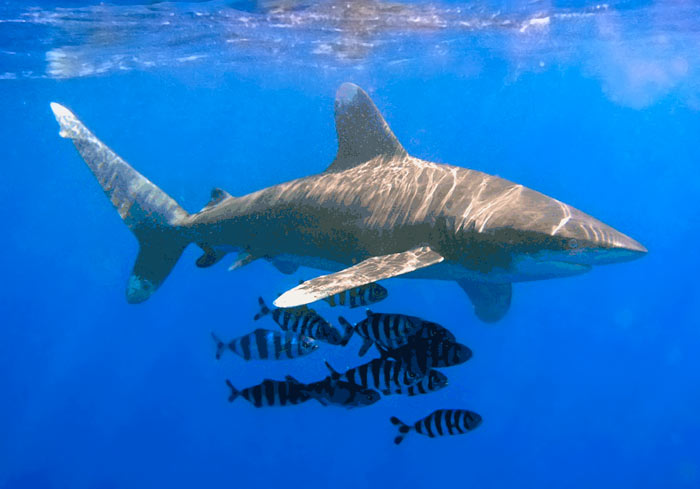Despite federal protection, giant manta rays and oceanic whitetip sharks are still being slaughtered by reckless fishing practices

Washington, D.C. — On behalf of the Center for Biological Diversity and Defenders of Wildlife, Earthjustice today filed a notice of intent to sue the Trump administration for failing to protect oceanic whitetip sharks and giant manta rays from being killed by longlines and huge nets used by U.S. fishermen in Atlantic fisheries.
Defenders petitioned the National Marine Fisheries Service to list the oceanic whitetip shark and giant manta ray under the Endangered Species Act in 2015. The agency listed the shark and ray as threatened last year, triggering the agency’s obligation to consider conservation measures to protect the species from federal actions when authorizing U.S. fisheries.
Today’s notice letter to the Fisheries Service says officials have not completed required consultations when authorizing fisheries managed under the Atlantic Highly Migratory Species Fishery Management Plan. The Endangered Species Act requires consultations to ensure that federal actions do not unduly harm protected species.
The agency has not completed these consultations on the pelagic longline (which targets tuna, swordfish and other species), shark drift gillnet or shark bottom longline fisheries — all of which harm oceanic whitetip sharks and giant manta rays and have contributed to the species‘ declines.
“These sharks and rays won federal protection, but they’re still being slaughtered by reckless fishing practices,” said Catherine Kilduff, a Center attorney. “The Trump administration has to follow through by regulating the deadly Atlantic longline and gillnet fisheries. Giant manta rays and oceanic whitetip sharks will keep declining if our government doesn’t do its moral and legal duty to protect them.”
The giant manta ray, with a wingspan that can reach 29 feet, has suffered population declines of up to 95 percent in some places due to commercial fishing. Similarly, scientists have estimated substantial declines in oceanic whitetip sharks in the Atlantic Ocean, including an 88 percent decline in the Gulf of Mexico due to commercial fishing. Reducing the primary threat to these species, commercial fishing, is key to their survival and recovery.
Giant manta rays and oceanic whitetip sharks are intentionally hunted in other countries — the sharks for their large fins and the manta rays for their gills, both prized for Asian medicines and cuisine — and are often swept up as bycatch by U.S. fisheries. Gillnets have been called “walls of death” for the harm they do to a variety of marine species. Atlantic longlines can be up to 45 miles long, with hundreds of baited hooks.
read full article on www.earthjustice.org







